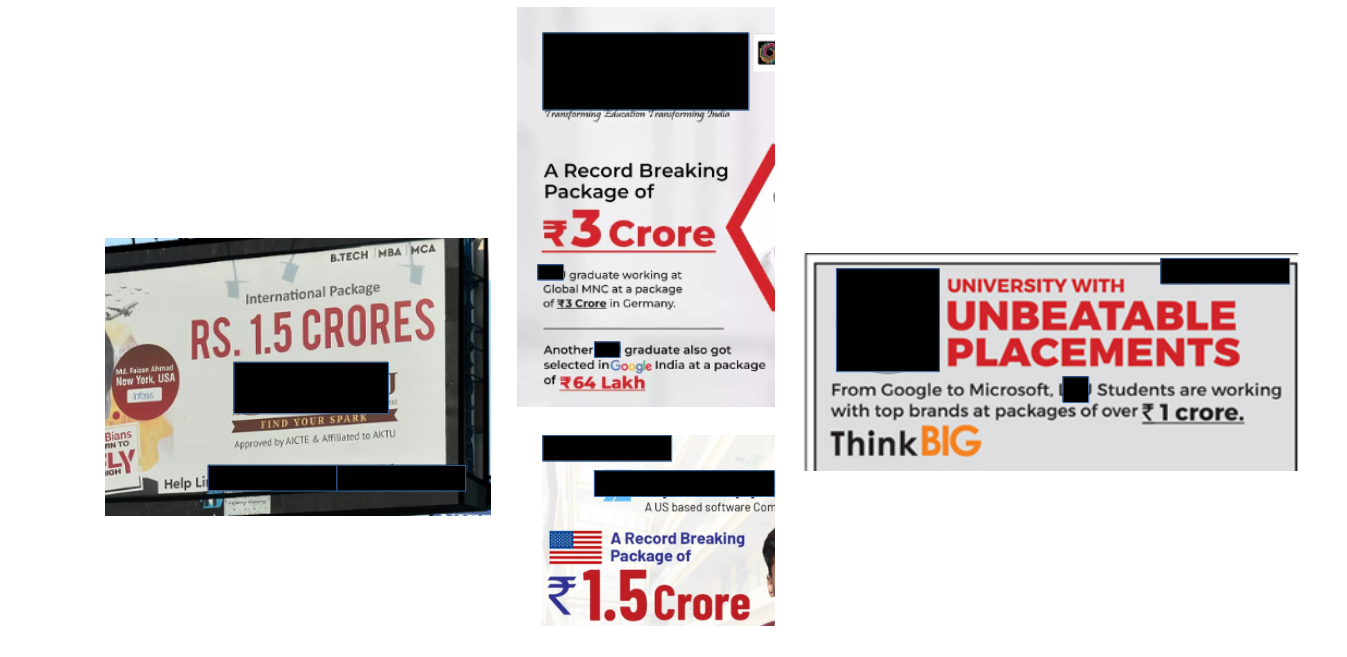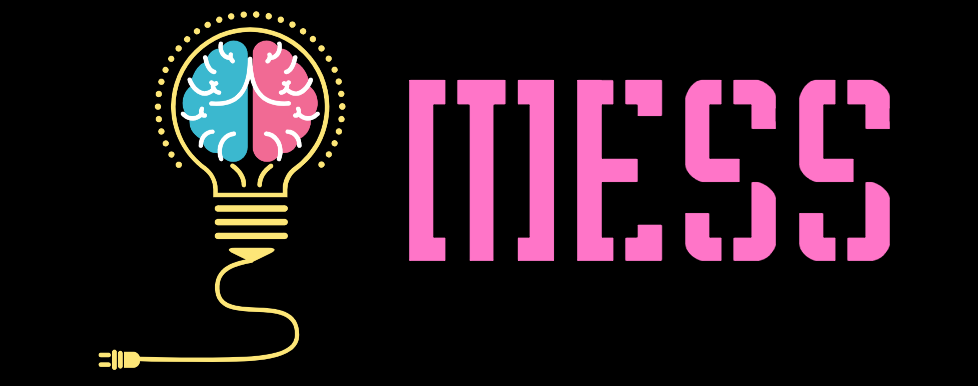The Pitfalls of 'Black Ads' by Universities & Colleges: Misleading Expectations and Student Discontent

The article advocates for a shift in focus – one that prioritizes holistic education, skill development, and personal growth rather than just the pursuit of the highest placement packages. It underscores the importance of transparency, emphasizing that an informed student is better equipped to make choices that align with their individual aspirations and abilities.
What are these: In the fiercely competitive landscape of higher education in India, "Black Ads" have emerged as a controversial marketing strategy employed by many universities and colleges. These ads prominently feature the highest placement packages that a select few students from their institution have secured during campus placements. The term "Black Ads" itself signifies the dark side of this practice, suggesting that it might be misleading or unethical.
Why are these: The primary intent behind these advertisements is clear: to entice prospective students and their families by showcasing the astronomical salaries some graduates have obtained. Universities use these ads as a powerful tool to stand out in the crowded marketplace, appealing to the aspirations of students and parents alike. These eye-catching figures are, after all, a significant draw for students seeking a return on their educational investment.
Why are they Black: However, while "Black Ads" may succeed in drawing attention, they simultaneously set the stage for a perilous dynamic. By emphasizing only the highest placement packages, they inadvertently create an unrealistic benchmark for all students to measure themselves against. As a result, many students enter these institutions with the belief that securing such lucrative positions is not only possible but expected.
The Prevalence of "Black Ads": This phenomenon is far from isolated; "Black Ads" have become increasingly prevalent across the Indian educational landscape. From renowned universities to lesser-known colleges, many institutions employ this strategy as a marketing tactic. The ubiquity of these advertisements raises questions about their ethics and long-term consequences. In essence, "Black Ads" represent a double-edged sword in the realm of higher education in India. While they aim to attract students with the allure of high salaries, they often lead to unrealistic expectations and, in some cases, dissatisfaction among students who are unable to achieve such exceptional placements. This warrants a closer examination of the ethical implications and the need for a more balanced approach to marketing education in the country.

The negative impact of "Black Ads" on student expectations is essential to understanding the harm caused by these advertisements:
Unrealistic Aspirations: "Black Ads" create a false impression that securing high-paying jobs is the norm rather than the exception. As a result, students often enter universities with unrealistic career aspirations.
Pressure to Excel: These advertisements inadvertently place immense pressure on students to excel academically and professionally. The fear of not living up to the showcased high standards can lead to heightened stress levels and anxiety.
Dissatisfaction and Disillusionment: When students don't achieve the advertised placement packages, they can feel disillusioned and dissatisfied with their educational experience. This dissatisfaction can manifest as resentment towards the institution and even impact their mental well-being.

The psychological impact of misleading advertisements, such as "Black Ads," on students cannot be underestimated. Here's a detailed exploration of how these advertisements can affect students' mental health, self-esteem, and overall well-being:
Increased Stress and Anxiety: Misleading advertisements place undue pressure on students to meet unrealistic expectations. The fear of falling short of the promised placements can result in heightened stress and anxiety levels. The constant worry about securing a high-paying job can be mentally exhausting.
Eroding Self-Esteem: When students perceive themselves as failing to meet the standards set by these ads, it can erode their self-esteem. Feelings of inadequacy and self-doubt may creep in, negatively impacting their self-worth and self-confidence.
Depression and Discontent: Persistent feelings of not measuring up to the advertised success stories can lead to depression and discontent. Students may question their life choices and the value of their education, which can be emotionally distressing.
Peer Comparison: Students often compare themselves to their peers, especially in a competitive academic environment. Misleading advertisements can intensify this comparison, causing jealousy and resentment towards classmates who appear to be achieving more.
Academic Performance: The psychological toll can spill over into academic performance. Students may struggle to concentrate on their studies due to the anxiety and stress induced by these ads, further affecting their overall well-being.
Future Uncertainty: Unrealistic expectations generated by misleading advertisements can create a sense of uncertainty about the future. Students may become obsessed with securing high-paying jobs, losing sight of their true passions and long-term career goals.
Long-Term Well-Being: The psychological impact can extend beyond the academic years. Even after graduation, students may carry the emotional scars of unmet expectations, affecting their overall well-being and job satisfaction.
In summary, misleading advertisements can have a profound and lasting impact on students' mental health, self-esteem, and overall well-being. The pressure to live up to these unrealistic standards can lead to stress, anxiety, depression, and a sense of discontent. It's essential for both educational institutions and society as a whole to recognize these consequences and work towards fostering a healthier, more balanced approach to education and career aspirations.

When we consider the ethical responsibilities of universities in managing student expectations, we enter a realm of paramount importance. These institutions serve as more than mere degree mills; they are entrusted with shaping the futures and mental well-being of their students. Here's a comprehensive exploration of this ethical responsibility.
Promoting Realism: First and foremost, universities have a moral obligation to promote realism in their marketing endeavors. When they selectively showcase only the highest placement packages, they create a misleading image of uniform success, breaching the trust that students and their families place in these institutions. This can lead to disappointment, disillusionment, and a sense of betrayal among students.
Duty of Care: Ethical considerations dictate that educational institutions hold a duty of care towards their students. This duty extends beyond academic excellence to encompass students' overall well-being, including their mental health and emotional stability. By perpetuating unrealistic expectations, universities may inadvertently neglect this vital duty, contributing to heightened stress, anxiety, and even depression among their student body.
Transparency and Holistic Education: Ethical responsibility should drive universities to prioritize transparency in reporting placement statistics. Instead of fixating solely on the highest placements, universities should focus on providing a well-rounded education that nurtures critical thinking, creativity, and personal growth. Additionally, robust career guidance and counseling services can help students make informed decisions about their future, aligning their choices with their aptitudes and interests.
In conclusion, universities play a pivotal role in shaping not just careers but also the mental well-being of their students. Ethically, they must prioritize transparency, realistic marketing, and holistic education, ensuring that students embark on their educational journeys with clarity, confidence, and a genuine sense of purpose.

In the quest to attract students without resorting to misleading tactics, universities can adopt alternative strategies that emphasize transparency and authenticity. Here's a discussion of these alternative methods:
Transparency in Reporting Placement Statistics: The cornerstone of ethical promotion lies in transparency. Universities should provide a comprehensive view of their placement data, including median and average salaries, industry-wise placements, and the percentage of students placed. This detailed information allows students to make informed choices based on realistic expectations.
Showcase Diverse Career Paths: Instead of fixating on the highest packages, universities can celebrate the diverse career paths their alumni have taken. Highlighting success stories across various industries and roles showcases the versatility of the education they provide and inspires students to explore different avenues.
Emphasize Skill Development: Promote educational programs based on the skills students will acquire, rather than just the jobs they may secure. Universities can underscore the development of critical thinking, problem-solving, communication, and adaptability as valuable assets in the professional world.
Personalized Career Counseling: Implement robust career counseling services that help students align their aspirations with their skills and interests. This one-on-one guidance can empower students to make choices that suit their individual career goals.
Alumni Engagement: Encourage active engagement between current students and alumni. Hearing firsthand about alumni experiences, challenges, and successes can provide a more realistic and relatable perspective on post-graduation life.
By adopting these alternative strategies, universities can create an environment of trust and authenticity. They can ensure that students embark on their academic journeys with a clear understanding of the opportunities and challenges that lie ahead, ultimately fostering a more positive and rewarding educational experience.

In today's era of information overload, it's paramount that readers approach university advertisements with a discerning eye. Rather than accepting marketing claims at face value, they should cultivate a healthy skepticism and a critical mindset. This entails scrutinizing the promises of astronomical placement packages and considering the broader picture. Transparency is the linchpin of this critical evaluation. Readers must demand universities to provide a comprehensive and truthful account of their placement statistics. Instead of focusing solely on the highest packages secured by a select few, institutions should divulge data encompassing a spectrum of placements, including median and average salaries, industry-wise distributions, and job roles. Such transparency not only empowers students and their families to make informed choices but also holds universities accountable for the accuracy of their claims. Simultaneously, it's incumbent upon universities to prioritize holistic education over the single-minded pursuit of the highest placement packages. They should recognize that their role extends beyond being job placement agencies. Instead, their mission should encompass nurturing well-rounded individuals equipped with critical thinking skills, adaptability, and a deep sense of personal and professional ethics. This approach not only prepares students for a rapidly evolving job market but also fosters personal growth and societal contributions.


